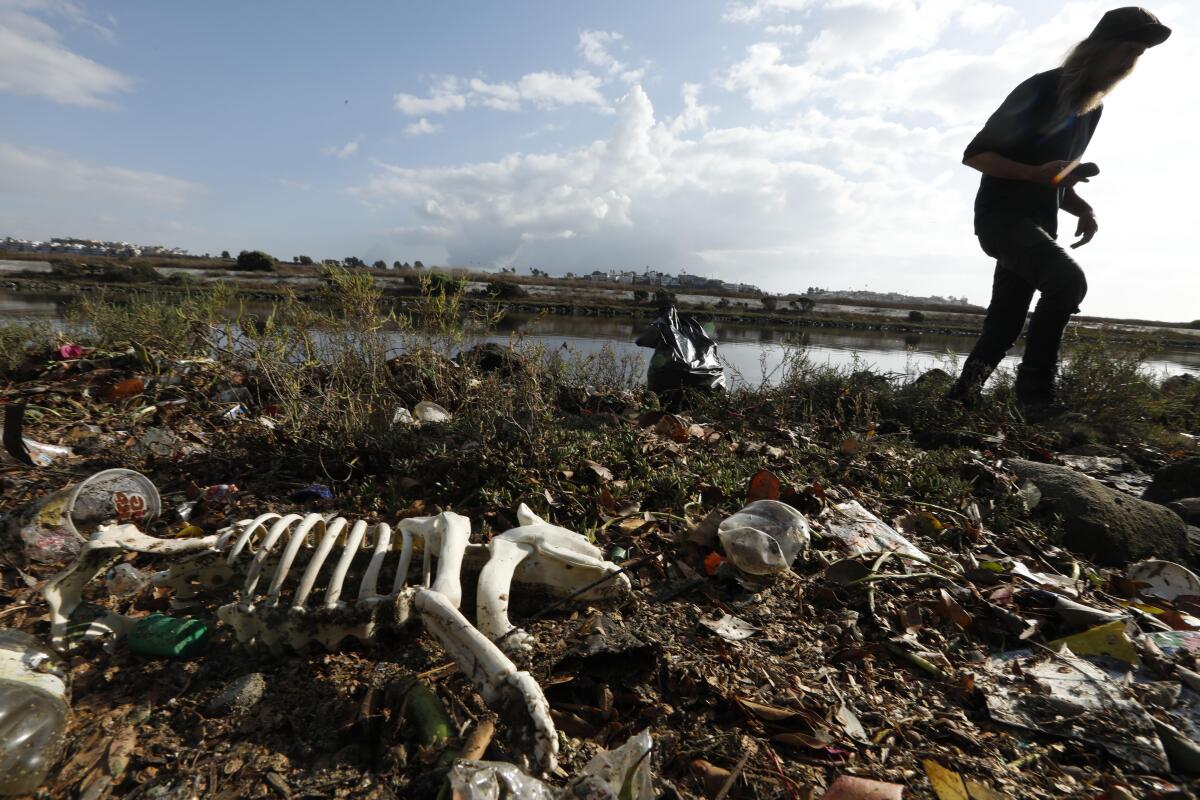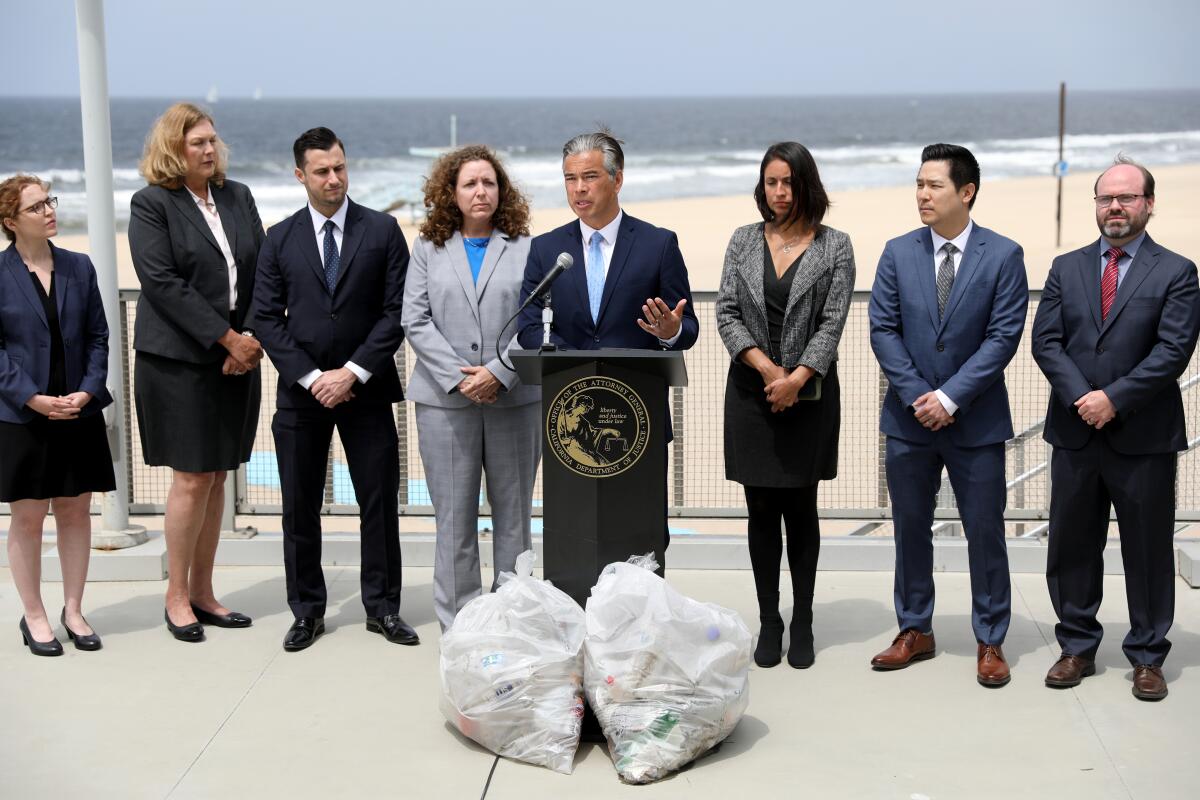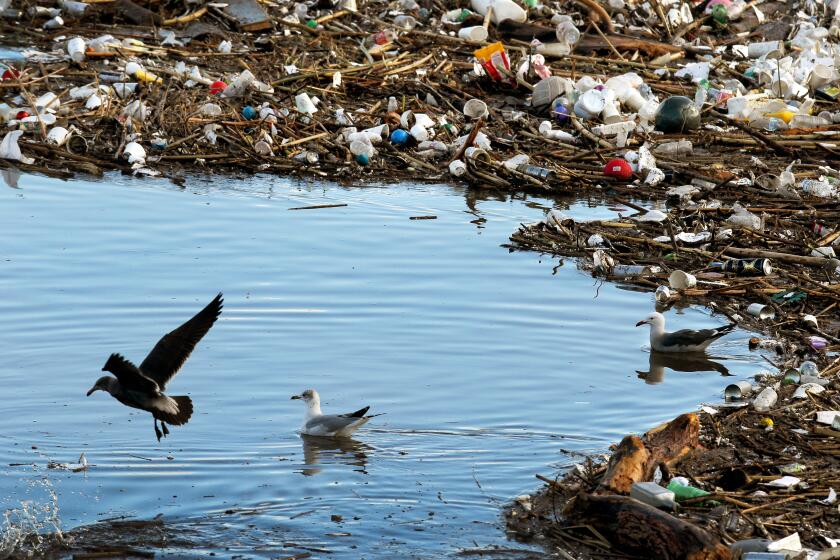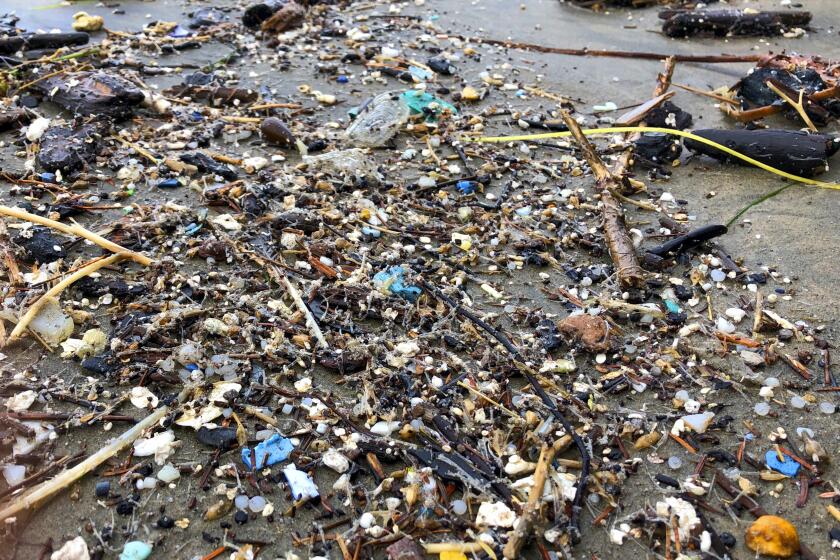State accuses Exxon Mobil of deceiving public, perpetuating ‘myth’ of plastics recycling

- Share via
California’s attorney general has announced a first-of-its kind investigation into the fossil fuel and petrochemical industries for their alleged role in causing and exacerbating a global crisis in plastic waste pollution.
Atty. Gen. Rob Bonta said Thursday that his office has subpoenaed Exxon Mobil Corp. seeking information related to the company’s “historic and ongoing efforts” to minimize the public’s understanding of the harmful consequences of plastic.

“For more than half a century, the plastics industry has engaged in an aggressive campaign to deceive the public, perpetuating a myth that recycling can solve the plastics crisis,” Bonta said.
Fossil fuels such as oil and gas are the raw material of most plastics. In recent decades, the accumulation of plastic waste has overwhelmed waterways and oceans, sickening marine life and threatening human health.
Environmentalists and industry are at odds over a November ballot initiative that would reduce single-use plastics and polystyrene food containers.
In a statement released late Thursday, Exxon Mobil denied the accusations.
“We reject the allegations made by the attorney general’s office in its press release,” said Julie L. King, a spokeswoman for the corporation. “We are focused on solutions and meritless allegations like these distract from the important collaborative work that is underway to enhance waste management and improve circularity.”
King said Exxon Mobil has been collaborating with governments including the state of California, communities and other industries to support commercial-scale advanced recycling.
The announcement of the investigation comes amid an urgent and growing movement across California to curb plastic pollution by reducing it at its source. In the last two weeks, the city and county of Los Angeles have announced ordinances and directives to reduce plastic waste, while state legislators, lobbyists and negotiators debate a bill that could ban several forms of single-use plastics. Also, in November, Californians will have the opportunity to vote on a ballot initiative designed to curb plastic pollution.
Speaking at Dockweiler State Beach — an area of Los Angeles County coast sandwiched between a Chevron oil refinery and a major sewage outflow — Bonta said that despite the public’s perception that plastics are heavily recycled, more than 90% of them end up either buried in landfills, burned or flushed into the ocean.
Internal documents from the 1970s warned industry executives that recycling was “infeasible,” he noted, and that there was “serious doubt” that plastic recycling “can ever be made viable on an economic basis.” Indeed, despite the industry’s decades-long recycling campaign, the vast majority of plastic products, by design, cannot be recycled and the U.S. plastic recycling rate has never broken 9%.
“In California and across the globe, we are seeing the catastrophic results of the fossil fuel industry’s decades-long campaign of deception. Plastic pollution is seeping into our waterways, poisoning our environment and blighting our landscapes,” Bonta said. “Enough is enough.”
State officials have moved to limit single-use plastics and filter out the toxic pollutants from waterways before they reach the sea.
No other state or country has undertaken such an investigation into the oil and plastics industry. However, California’s probe does mirror other climate change investigations and lawsuits that governments across the nation have launched against the fossil fuel industry, accusing it of deception and seeking compensation for the risks and dangers caused by its products.
“This is connecting the dots at a higher level than we have ever seen before, in a way that could hold fossil fuel companies accountable for one of the greatest environmental crises of our time,” said Jennifer Savage, who leads Surfrider Foundation’s national efforts to stop plastic pollution.
“Most people don’t realize how tightly plastic production is tied to the fossil fuel industry,” she said. “People don’t think of plastic pollution as a fossil fuel or climate change issue, but they’re truly two sides of the same coin. … The only way that we are going to solve the plastic pollution crisis is to hold the fossil fuel industry accountable. And this is a major step in that direction.”
The attorney general’s investigation is aimed at determining if any of Exxon Mobil’s actions violated state law and were based on “good faith” understanding of open-source materials about the industry. The subpoena, Bonta noted, is just the beginning. He said his legal team was starting with Exxon Mobil because it is “one of the, if not the biggest producer of plastics in the world, as well as one of the leaders when it comes to deception. They have distinguished themselves because of the amount of plastic they have produced and put into the world.”
The plastics industry began an aggressive campaign in the 1980s to sway public opinion when state legislatures and local governments tried to consider restricting or banning plastic products, Bonta said. “We will be as comprehensive, as thorough, as broad, as is necessary, to get to the bottom of this issue of the harm that plastics has caused — and the deception — both past and ongoing,” he said of the investigation.
Responding to the probe’s announcement, Matthew Kastner, spokesman for the American Chemistry Council, a trade group representing Exxon Mobil and the petrochemical industry, said in a statement that “plastics belong in our economy, not our environment.” He said his organization is committed to a more “sustainable future” that includes “bold” government actions, as well as increasing recycling and waste management infrastructure.
He did not specifically respond to questions about the subpoena or investigation.
Jay Ziegler, director of policy and external affairs for the Nature Conservancy in California, said that Thursday’s action by the state reminded him of the major investigations that had exposed the tobacco industry.
“Wow, it’s like ‘Thank You For Smoking’ all over again,” Ziegler said, referring to the satirical novel by Christopher Buckley that follows a tobacco lobbyist who promotes the benefits of cigarette smoking.
Nick Lapis, director of advocacy for Californians Against Waste, agreed.
“This is no different than the tactics used by the tobacco industry to promote smoking and by these same oil companies to prevent action on climate change,” he said. “They know that what they are doing is destroying the planet and affecting pubic health, but instead of investing in sustainable alternatives they spend their money to lobby against reform and to deceive the public.”
Sean Hecht, co-executive director of UCLA School of Law’s Emmett Institute on Climate Change and the Environment, noted similarities to the ongoing challenges against opioid manufacturers, as well as the recent climate disinformation cases making their way through court.
He also pointed to a lawsuit led by Santa Clara County against former lead paint manufacturers. The case, which was settled in 2019 after 20 years of litigation, “was seen as quite significant in establishing that there could be liability in a case like this,” he said.
Plastics never fully degrade. They just break down into smaller and smaller pieces called microplastics. These particles often contain harmful chemical additives such as flame retardants or plasticizers, and a widely cited scientific review of 52 studies concluded that humans on average consume a credit card’s worth of microplastic each week.
In just the last few months, research has shown the presence of plastic particles in human blood, healthy lung tissue and meconium — the first bowel movement of a newborn. They are also found in marine organisms, ocean water, air and soil.
Some researchers project that by 2050, there may be more plastic by weight in the world’s oceans than there are fish. UC Davis researchers once sampled seafood sold at markets in Half Moon Bay and found that one-quarter of fish and one-third of shellfish contained plastic debris.
Nevertheless, plastic production has continued to grow, and records show that the fossil fuel and petrochemical industries are still expanding their plastics infrastructure and capabilities. In the U.S. alone, companies from across the globe have invested $208 billion since 2010 in new facilities, expansions and factory restarts.
State Sen. Ben Allen (D-Santa Monica), who has championed this issue for years, said that all the momentum now coming together across the state speaks to how pressing the plastics issue has become.
“We all recognize what an urgent issue this is,” he said, “and that’s why we’re so deeply committed.”










